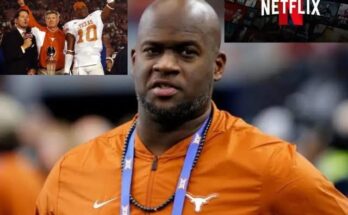Can Kalen DeBoer Become the Kind of Transformational Leader for Alabama Football That Patrick Mahomes Has Been for the Kansas City Chiefs?
When Kalen DeBoer accepted the monumental task of succeeding Nick Saban at Alabama, the comparisons and expectations were immediate and colossal. After all, Saban wasn’t just another college coach—he was a living legend, a transformative figure who built a dynasty in Tuscaloosa that will stand the test of time. The shoes DeBoer is now tasked to fill are titanic in size and significance. But the question persists: Can Kalen DeBoer lead Alabama football in a way that mirrors the impact Patrick Mahomes has had on the Kansas City Chiefs?
At first glance, it might seem like an unfair or even odd comparison. Mahomes is a generational talent under center, redefining quarterback play in the NFL with his creativity, arm talent, and poise in big moments. DeBoer, on the other hand, is a coach, not a player. He won’t be throwing touchdown passes or scrambling for first downs. But dig deeper, and the comparison starts to make a certain kind of sense. What Mahomes did for the Chiefs was take a franchise that had potential but lacked modern-day greatness, and elevate it to perennial contender status. The Chiefs went from hopeful to dominant, from respected to feared. That transformation came not only from his physical gifts but also from his leadership, his understanding of the moment, and his ability to inspire those around him.
DeBoer is stepping into a different scenario. Alabama doesn’t need to be resurrected from mediocrity. It doesn’t need a miracle. What it does need, however, is a leader who can sustain and evolve the legacy built by Saban. It needs someone who can inspire confidence, build trust, and make decisions that position Alabama to continue its dominance in a changing college football landscape. And in that way, DeBoer’s role isn’t all that different from Mahomes’. Both are expected to lead elite organizations, navigate enormous pressure, and deliver championships.
DeBoer’s track record suggests he might just be that guy. At every stop in his coaching journey—whether it was at Sioux Falls, Fresno State, or Washington—he’s produced winning football. His offensive acumen is among the sharpest in the college ranks. At Washington, he took a team that had underachieved and turned them into a national title contender. His ability to develop quarterbacks and run complex, effective offenses is one of his most prized attributes. Michael Penix Jr., once plagued by injuries and inconsistency at Indiana, blossomed into a Heisman finalist under DeBoer’s guidance.
That ability to maximize talent, especially at the quarterback position, could be DeBoer’s biggest asset at Alabama. Saban built his dynasty on dominant defenses and game-managing quarterbacks, at least early on. In the latter years, however, he adapted and embraced a more explosive offensive philosophy. DeBoer arrives at a point where that shift is no longer optional—it’s essential. The modern college football game demands innovation, tempo, and vertical threats. DeBoer thrives in those areas, and that gives him a head start in this new chapter.
Just as Mahomes redefined what was possible for the Chiefs’ offense, DeBoer has the chance to reinvent Alabama’s attack. And he’s not doing it with a blank slate. The Crimson Tide continue to recruit at an elite level. The cupboard is far from bare. What DeBoer brings is the schematic expertise to unlock that talent, to take four- and five-star prospects and turn them into unstoppable units on the field.
But leadership goes beyond X’s and O’s. Mahomes is revered not just for his playmaking, but for the way he carries himself. He never points fingers, never throws teammates under the bus. He commands the locker room with a mix of humility and confidence that makes others want to follow him. DeBoer must cultivate the same dynamic in Tuscaloosa. Winning over a locker room that was loyal to Saban won’t be easy, but early reports suggest he’s making strong inroads. He’s already had key returners buy into his vision, and he’s re-recruiting existing talent while continuing to chase elite high school and transfer portal prospects.
That’s another key parallel—Mahomes became the central force that made Kansas City attractive to talent around the league. Veterans wanted to play with him. They took less money to chase rings. He was the gravitational pull that made Kansas City a destination. If DeBoer can become that figure in the college space—a coach that players gravitate toward because they know he can elevate their game and give them a real shot at the NFL—then he’ll solidify Alabama’s place at the top.
Recruiting is the lifeblood of college football, and DeBoer knows that. While he may not have the southern roots that Saban used to build deep relationships across SEC country, he’s already adapting. He’s strengthened his staff with strong recruiters who understand the region. He’s hitting the trail hard, going after not just high-profile national talent, but also key local battles that define SEC success. The early returns are promising. Alabama remains near the top of recruiting rankings, and more importantly, the energy around the program feels alive and confident—not desperate or uncertain.
Yet, none of this will matter without results. The expectation at Alabama isn’t just to compete—it’s to win. SEC titles, national championships, Heisman contenders, NFL Draft first-rounders. That’s the standard. Mahomes embraced those expectations in Kansas City and exceeded them. DeBoer must now do the same in a pressure cooker that allows no grace periods.
He’ll face intense scrutiny, especially early. Every decision will be dissected. Every loss will be magnified. But DeBoer’s calm demeanor and meticulous preparation are tailor-made for the grind. He doesn’t get rattled. He doesn’t panic. Like Mahomes in a two-minute drill, DeBoer seems to thrive in high-stress moments, where clear thinking and confidence make the difference.
The 2025 season will be a proving ground. The SEC is tougher than ever. Texas and Oklahoma have joined the fold. Georgia isn’t going anywhere. LSU, Ole Miss, and Tennessee are all reloaded and dangerous. There’s no easy path to the top. But that’s what makes this job special. That’s what makes the comparison to Mahomes all the more relevant. Just as Mahomes must go through a gauntlet of AFC contenders every year, DeBoer must stare down elite SEC programs and come out on top.
There’s also the intangible aspect of charisma and brand-building. Mahomes made the Chiefs cool. Kids in playgrounds wore his jersey. National TV broadcasts centered around his brilliance. He turned Kansas City into a team with global recognition. Alabama already has that status, but DeBoer has a chance to modernize its image. He’s younger, more engaging, and open to the new realities of NIL, the transfer portal, and digital branding. That makes him a potentially revolutionary figure at a program rooted in tradition.
His success will depend on balancing respect for the past with a bold vision for the future. Mahomes didn’t ignore Kansas City’s history—he built on it. DeBoer must do the same. Honor Saban’s process, learn from his blueprint, but don’t be afraid to innovate. Alabama fans don’t want a Saban clone—they want someone who can write the next chapter, and write it brilliantly.
So, can Kalen DeBoer be Alabama’s Mahomes? Can he be the figure who not only sustains greatness but elevates it to new, thrilling heights? The answer won’t come in a single game or even a single season. It’ll be written over years, through recruiting wins, championship hunts, and player development. But the potential is there. The foundation is solid. The mindset appears ready.
Alabama is entering a new era—an era without Nick Saban on the sidelines. That reality would terrify most programs. But with Kalen DeBoer at the helm, there’s a growing sense that not only can the Tide maintain their place among college football’s elite, they might just redefine what dominance looks like in the years to come. Just like Mahomes did in Kansas City, DeBoer now has the opportunity to be the new face of an old powerhouse. And if history is any guide, that kind of leadership can change everything.


